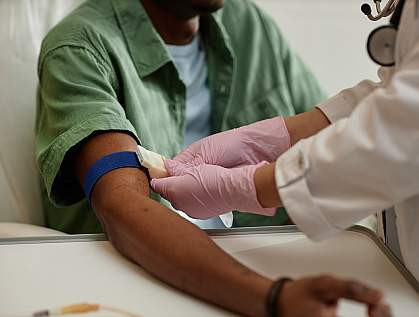Currently, diagnosing Alzheimer’s disease accurately is a complex process, often requiring either a spinal tap to collect cerebrospinal fluid or a sophisticated brain imaging test like a PET scan. These procedures are not typically available in your regular doctor’s office, creating a significant hurdle for early diagnosis and access to treatment. This delay can be frustrating, especially when early intervention is increasingly recognized as crucial in managing Alzheimer’s. Imagine a world where getting a clearer picture of your Alzheimer’s risk was as simple as a routine blood test. Groundbreaking research is making this future a tangible possibility, offering hope and streamlining the path to diagnosis.
 Nurse taking blood sample from senior patient
Nurse taking blood sample from senior patient
The Bottleneck in Alzheimer’s Diagnosis and Why Blood Tests Are a Game Changer
The current diagnostic pathway for Alzheimer’s presents a significant bottleneck. Since initial cognitive concerns are usually addressed in primary care clinics, the inability to perform advanced diagnostic tests there slows everything down. This delay has serious consequences. Without a confirmed diagnosis, individuals miss out on valuable treatments that can slow the disease’s progression and are excluded from participating in clinical trials for promising new therapies. For those concerned about cognitive decline or with a family history of Alzheimer’s, the question “Where Can I Get Blood Work Done?” for a preliminary assessment is becoming increasingly relevant.
Scientists have been diligently working to develop simpler, more accessible blood tests for Alzheimer’s. These tests focus on measuring key proteins associated with the disease – amyloid beta and tau. The abnormal accumulation of specific forms of these proteins in the brain can lead to their presence in the bloodstream. While numerous blood tests have shown encouraging initial results, many previous studies lacked real-world validation in typical healthcare settings like community clinics.
Landmark Study Validates Alzheimer’s Blood Test Accuracy in Primary Care Settings
A recent NIH-funded study, spearheaded by Drs. Sebastian Palmqvist and Oskar Hansson at Lund University in Sweden, has provided compelling evidence for the accuracy and practicality of an Alzheimer’s blood test. Researchers collected blood samples from over 500 older adults evaluated for cognitive symptoms in primary care clinics and nearly 700 from specialized memory care clinics.
The study utilized the PrecivityAD2 test, which measures the ratio of different types of amyloid beta and the proportion of tau protein represented by a specific form called p-tau217. Both measures have previously demonstrated their ability to predict Alzheimer’s diagnosis. Building on prior research, the team established the specific levels of these markers needed for a positive Alzheimer’s diagnosis.
The findings, published in JAMA on July 28, 2024, were remarkable. Across all participants, the blood test accurately predicted Alzheimer’s disease with an impressive 88% to 92% accuracy when compared to spinal fluid tests or PET scans. Further analysis revealed that measuring p-tau217 alone was almost as effective as using both measures.
Blood Test Outperforms Standard Clinical Evaluations
The study also highlighted the significant improvement offered by blood tests compared to standard clinical evaluations conducted without biomarker testing. Clinical evaluations alone were only 73% accurate in diagnosing Alzheimer’s in specialty memory clinics and a less reliable 61% accurate in primary care settings. This underscores the potential of blood tests to significantly enhance diagnostic accuracy, particularly in the crucial primary care environment where patients initially seek help.
Dr. Hansson emphasizes the importance of these findings, stating, “We see this as a major step towards global clinical implementation of an Alzheimer’s blood test.” The next critical steps involve establishing clear guidelines for integrating these blood tests into clinical practice, starting with specialist care and subsequently expanding to primary care. This crucial work is already underway, paving the way for wider accessibility.
When Can You Expect to Get an Alzheimer’s Blood Test?
While the PrecivityAD2 test used in the study is commercially available in the U.S., it’s important to note that it is not yet FDA-approved or widely covered by insurance plans. Furthermore, the study’s findings need to be replicated in more diverse populations beyond the Swedish cohort studied.
Despite these points, the study represents a significant leap forward. It brings us closer to a future where asking “where can I get blood work done for Alzheimer’s?” will have a straightforward answer, much like routine cholesterol or glucose tests. While widespread availability is still on the horizon, this research offers considerable hope for faster, more accessible Alzheimer’s diagnosis, ultimately benefiting countless individuals and families seeking clarity and timely intervention.


